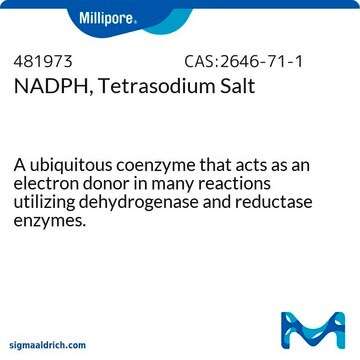N7785
β-Nicotinamide adenine dinucleotide 2′-phosphate reduced tetrasodium salt
vial of 10 mg, ~95%
Synonym(s):
β-NADPH, 2′-NADPH, Coenzyme II reduced tetrasodium salt, Dihydronicotinamide adenine dinucleotide phosphate tetrasodium salt, NADPH Na4, TPNH2 Na4, Triphosphopyridine nucleotide reduced tetrasodium salt
About This Item
Recommended Products
Assay
~95%
Quality Level
form
powder
packaging
vial of 10 mg
InChI
1S/C21H30N7O17P3.4Na/c22-17-12-19(25-7-24-17)28(8-26-12)21-16(44-46(33,34)35)14(30)11(43-21)6-41-48(38,39)45-47(36,37)40-5-10-13(29)15(31)20(42-10)27-3-1-2-9(4-27)18(23)32;;;;/h1,3-4,7-8,10-11,13-16,20-21,29-31H,2,5-6H2,(H2,23,32)(H,36,37)(H,38,39)(H2,22,24,25)(H2,33,34,35);;;;/q;4*+1/p-4/t10-,11+,13-,14+,15-,16+,20-,21+;;;;/m0..../s1
InChI key
WYWWVJHQDVCHKF-MPUNMZHWSA-J
Looking for similar products? Visit Product Comparison Guide
Application
Biochem/physiol Actions
Preparation Note
Other Notes
Storage Class Code
11 - Combustible Solids
WGK
WGK 3
Flash Point(F)
Not applicable
Flash Point(C)
Not applicable
Personal Protective Equipment
Certificates of Analysis (COA)
Search for Certificates of Analysis (COA) by entering the products Lot/Batch Number. Lot and Batch Numbers can be found on a product’s label following the words ‘Lot’ or ‘Batch’.
Already Own This Product?
Find documentation for the products that you have recently purchased in the Document Library.
Customers Also Viewed
Our team of scientists has experience in all areas of research including Life Science, Material Science, Chemical Synthesis, Chromatography, Analytical and many others.
Contact Technical Service











